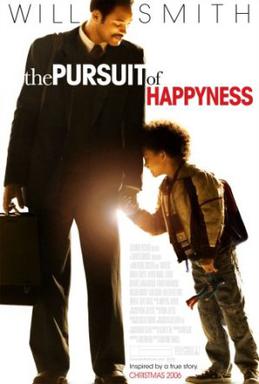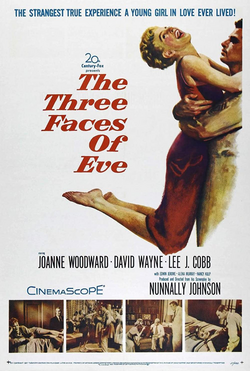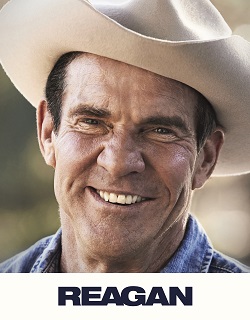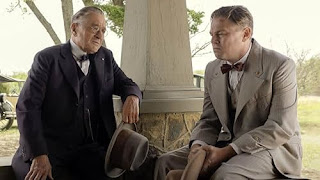Inspirational tales do not come more inspirational than The Pursuit of Happyness, the biopic of Chris Gardner. Time has softened the film's impact, but it still holds up relatively well.
Chris Gardner (Will Smith) has put all his family's savings into portable bone-density machines that he is convinced will be great sellers. Unfortunately, in 1981 San Francisco these bulky devices are seen by many doctors as an unnecessary extravagance. To make ends meet his wife Linda (Thandie Newton*) works double shifts at a hotel. This puts a strain not just on their finances but on their marriage, with only their son Chris, Jr. (Jaden Christopher Syre Smith*) holding them together.
The Gardners continue struggling, though, until Chris notices a sign for interns with the Dean Witter Brokerage Firm. He through sheer will makes a positive impression on Jay Twistle (Brian Howe), a partner at the firm, with a little help from a Rubik's Cube that Gardner is able to solve. This internship, which can lead to getting hired at Dean Witter, may be a way out of the Gardner family financial struggles. Chris, however, is devastated when he learns that it will not only be unpaid, but that there is no guarantee that he will get a job there if he makes it through.
Despite this, he agrees to enter the internship. This is the end for Linda, who leaves him for a job in New York. Eventually conceding to Chris' insistence, Chris, Jr. stays with him instead of his mother. Now, Chris Sr. and Jr. continue struggling to keep body and soul together. It is not that Chris, Sr. does not work. It is that unpaid parking tickets, poor bone-density machine sales (including the theft of two of them) and the unpaid nature of the internship continue to wreak havoc. It is to where Chris Sr. and Jr. are made homeless, having to sleep in BART restrooms and homeless shelters.
Chris, however, will not give up. He boldly goes to the home of a potential client whom he barely missed an appointment with: Walter Ribbon (Kurt Fuller). Gardner never lets on to his potential clients or fellow interns that he is living in a homeless shelter or that he is beyond broke. Will Chris Gardner earn that coveted job post-internship and save his son from poverty?
I remember watching The Pursuit of Happyness (the spelling of "Happyness" coming from a misspelled mural at Chris, Jr.'s daycare) and being deeply moved at the time. Perhaps I have grown more cynical in the almost twenty years since The Pursuit of Happyness premiered. Perhaps the antics of Smith pere et fil in the ensuing years now colors somewhat my view of them in the film. I was surprised that I did not have the same reaction to the film now.
What I mostly thought was how dumb Gardner was at times. Why could he not bring in that bone-density machine to his initial internship interview? Certainly, it would have made more sense than to leave it with some hippie street singer. Granted, he did say in voiceover that "this part of the story is called Being Stupid", so credit where it is due. However, he also seemed genuinely surprised that the police would come for him over unpaid parking tickets or that the IRS would raid his banking account.
I will leave aside how he probably should not have invested everything into those bone-density machines. I kept thinking that Gardner kept making one lousy decision after another.
Another element that now has me less enthusiastic about The Pursuit of Happyness is on the portrayal of the homeless. I figure that there are such cases like the Gardners, who through poor economic choices and circumstances do end up in homeless shelters. However, I think this is more the exception than the rule. Many homeless have mental health issues, some downright delusional and with various chemical dependency problems. I could not shake the idea that The Pursuit of Happyness was attempting to suggest that homelessness was strictly and purely financial when it is a very complex issue. To be fair, the film is not about homelessness but about Chris Gardner's personal story. As such, I may be reading too much into things, but I digress.
I think that one element that pushes The Pursuit of Happyness down is Will Smith's voiceover. I understand what Steven Conrad's screenplay was going for whenever he had Chris Gardner tell us his thoughts. I just thought that there was too much of it to where it veered close to parody. It did give Will Smith a nice Oscar clip when he tells Chris, Jr. to never let anyone tell him he cannot do something. Oddly, this was not the clip that was used at the Academy Awards presentation when Smith was nominated for Best Actor. Perhaps the overt nature of the "Follow your dreams" speech was too much even for the Academy.
I think the film would have done better to cut back on the voiceovers. Again, I think it wanted to suggest a more intimate conversation with Gardner. I just found it distracting and excessive. This is not to take away from a good performance from Will Smith as Chris Gardner. His best scenes were when playing off against his real-life son Jaden. There was a natural manner to those scenes which made them effective. His last scene, when he learns that he did get the job, is quite good in its understated manner. We see only the tears forming, but it is the quite manner that gets the viewer more than if he had broken down and had a big dramatic moment. He was less effective when he was working with others. His scenes with Newton seemed a bit more forced, as if they wanted to push the drama but were pushing too hard.
Speaking of Newton, I felt that The Pursuit of Happyness portrayed Linda Gardner in perhaps an unfair light. She came across as almost irrationally angry when in reality she had every right to be frustrated at Chris' poor decision making. Here she is, attempting to keep a steady job and care for her son, and her husband continues to struggle to have an even income. I did not think that she was wrong in her frustrations or worry or anger. I think the film did.
Jaden Smith was precocious as Chris, Jr., with some good moments. Of particular note is when he and Chris, Sr. are pretending to have gone back in time and see dinosaurs. In retrospect, we can see that Jaden Smith is good when he is not the central character.
It is nice to see that the stockbrokers in The Pursuit of Happyness were not portrayed as Gordon Gekko types who celebrate greed. Instead, they were decent people who cared for their own families and in a nice moment, showed both gratitude and respect for past kindnesses.
Again, I was surprised that The Pursuit of Happyness did not hit me as hard as it did the first time. It is still a pretty good movie. It is appropriately inspirational and with a good performance from both Smiths. Time may have diminished some of its power, but I think people will still get something out of The Pursuit of Happyness.
*Mr. Smith was billed as "Jaden Christopher Syer Smith" and Ms. Newton was billed as "Thandie" at the time they appeared in The Pursuit of Happyness. Smith now goes by his first and last names and Newton has since returned to her original name of "Thandiwe". To avoid any potential confusion, I used the names used at the time of the film's release.










_poster.jpg)




























